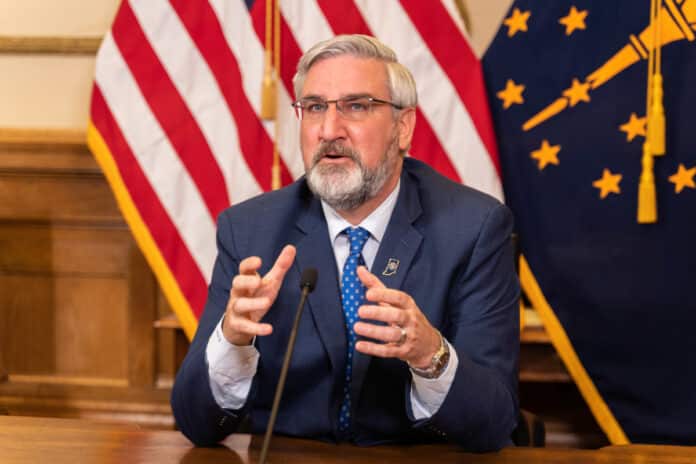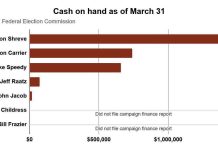INDIANAPOLIS — Gov. Eric Holcomb has vetoed Senate Bill 5, which would allow local elected officials to overrule orders issued by a city or county health department during a public health emergency.
The final version of the bill passed the House by a vote of 65-29 and the Senate by a vote of 37-12.
Republican lawmakers characterize the bill as a way to allow local officials to have checks and balances over health departments when health officials impose restrictions on citizens during emergencies. Many were unhappy when local officials sometimes imposed stricter conditions than the state during the pandemic.
But many Democratic lawmakers said the bill would weaken the authority of health officials, who need to act quickly during emergencies.
In a letter to Rodric Bray, President Pro Tempore of the Indiana Senate, Holcomb said throughout the pandemic, state and local leaders struck a careful balance between protecting both lives and livelihoods to ensure Indiana and communities would come out of the pandemic as strong as possible.
“As a result, we now stand in an enviable position compared to many around the country. As evidence of this, look no further than our 3.9% unemployment, $2B in additional state revenues, and our ability to make transformational investments in local communities in areas such as education, economic development and mental health,” the governor wrote
Holcomb said critical to this success has been the ability during the emergency to allow local health officers to use localized data to tailor their action’s to the community’s needs.
“It is hard to express the rapidity needed in the early days of the pandemic — particularly on the local level,” Holcomb wrote. “One reason Indiana has weathered the storm so well is due to coordination with local health experts and the flexibility in the law to be fast, nimble and targeted. Also the knowledge that local health officials were able to exercise this discretionary authority greatly informed the state’s own day-to-day, sometimes hour-by-hour, emergency response.”
Holcomb said he believed Senate Bill 5 would undermine the successful balance he had described, restrict necessary flexibility in the law, and further undermine local responses to future public health emergencies.
Under the bill, if the governor declares an emergency as an executive order, local health departments can’t adopt more stringent orders without first receiving approval from the local legislative body.
A citizen or business affected by an order can appeal the enforcement action directly in circuit or superior court or appeal to the legislative body that imposed the restriction.
Holcomb has repeatedly allowed local governments to impose more restrictive measures during the pandemic. Indianapolis Mayor Joe Hogsett and the Marion County Health Department have continuously done so, as have some other counties.
The bill’s sponsor, Rep. Matt Lehman, R-Berne, has said the pandemic revealed the important role of local health administrators, but said the legislation would rightly put them under the responsibility of local elected officials who are closer to the public during health emergencies.
The Indiana Public Health Association (which represents several hospitals, health departments and medical organizations) and the Indiana State Association of County and City Health Officials (which represents the physician health officers and public health professionals at the local level) urged Holcomb to veto the bill.
They point out that every local health department already has citizen representation on it, and that adding an extra layer of oversight would just slow down the reaction time during a health emergency.
“If you’ve got someone that has hepatitis working at restaurant, you need to be able to get that employee out of the workplace and treated,” Susan Jo Thomas, past president of the Indiana Public Health Association and executive director of Covering Kids & Families of Indiana, told the Indianapolis Business Journal.
She added: “That needs to be almost immediate, or you’re going to have a big spread.” The same is true, she said, if deadly bacteria is found in a local swimming pool.
Dr. Jeremy Adler, health officer for Tippecanoe County and president of the Indiana State Association of County and City Health Officials, said the pandemic showed the need for swift action during outbreaks.
“What we witnessed during the pandemic is that during public health emergencies, quick action is often needed to prevent disease and save lives,” Adler told IBJ. “And local health departments need to have the ability to take action and tailor their measures to the specific needs of the population they serve.”
The groups say they are apprehensive of the transfer of major public health decisions to elected officials, most of whom lack the expertise needed to properly engage in unusually complex public health subject and regulatory matters.
They say another major concern is shifting local health enforcement appeals processes from courts to city and county boards. This would require significant additional infrastructure on the city and county level and would also add another cumbersome layer for public health officials to navigate.
“Our local boards of health and local health officers are actually appointed and entrusted to act based on data and science and in the best interest of their communities,” Adler said. “So this bill really could jeopardize the health and safety of Hoosiers.”
For more on this story, see Wednesday’s Republic.





